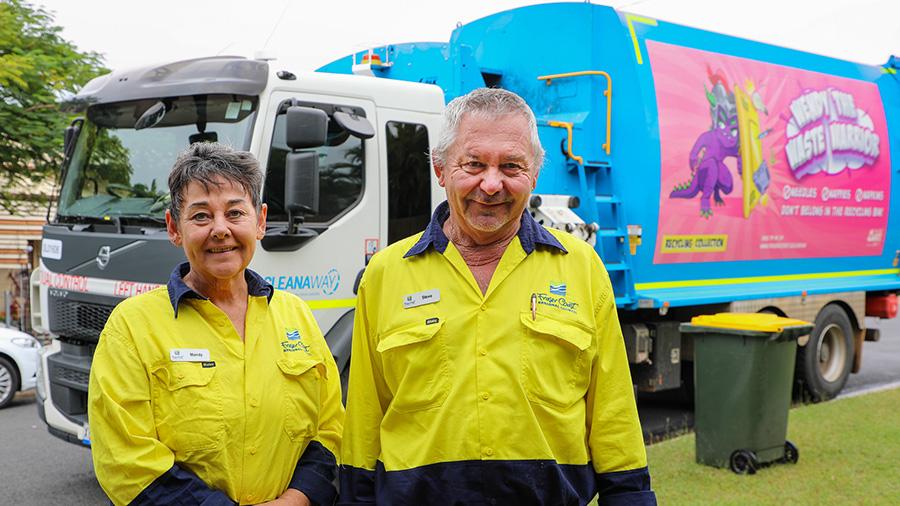Better Bin program highlights top recycling issues

Bottle lids left on, soft plastics and rigid household plastics are the main items causing contamination in yellow lid recycling bins, Fraser Coast Regional Council’s Better Bin program has revealed.
Over the past six months, Recycling Support Officers have visually checked more than 15,000 yellow-lid bins and nominated almost 700 households for a Golden Bin award for excellent recycling.
Supported by the Queensland Government’s Recycling and Jobs Fund, the Better Bin program is designed to help households recycle right, reduce contamination and make the most of the region’s new Materials Recovery Facility in Maryborough.
Resource Recovery spokesperson Cr Michelle Byrne said Recycling Support Officers had been providing friendly feedback and tracking trends since the program began in May.
“We’ve seen fantastic participation with residents keen to recycle right,” she said.
“Our new Materials Recovery Facility is built to handle more – but to get the best results for our environment, it all starts at home.”
The top three recycling issues are:
- Bottle lids left on - Most are milk and soft drink bottle caps, with some spray and pump tops. Lids are too small for recycling machinery and can become dangerous projectiles when bottles are compressed.
Remove lids before recycling. Plastic bottle caps can be dropped off at the Maryborough and Nikenbah waste facilities for special recycling.
- Soft plastics - Common finds include coffee sachets, cling wrap from produce/meat trays, and large bags previously containing pool salt, fertiliser, stockfeed, potting mix, and dog food. These tangle machinery and contaminate clean paper and cardboard.
Use the ‘scrunch test’: if you can easily scrunch it into a ball, it’s soft plastic and should be put in general waste or avoided altogether.
- Rigid plastics like plant pots and toys - Rigid plastics are different from the hard plastics that can be processed through the kerbside recycling bins. Rigid plastics include plant pots, coat hangers, toys, and mower and car parts. These items can’t be processed through kerbside recycling.
Donate reusable items or take them to Council’s waste facilities.
Cr Byrne said understanding these differences helps ensure valuable materials are recycled properly.
“Once collected, your recycling is sorted into paper, plastics, steel, aluminium and glass at the Materials Recovery Facility and sent on to become new products - from car parts and fleece jackets to road surfacing,” she said.
“By putting the right items in the right bins, residents help protect workers, reduce waste processing costs and keep Queensland’s circular economy turning.”
For more details on how to recycle right, visit www.frasercoast.qld.gov.au/recycling and check out the ‘A – Z guide’
